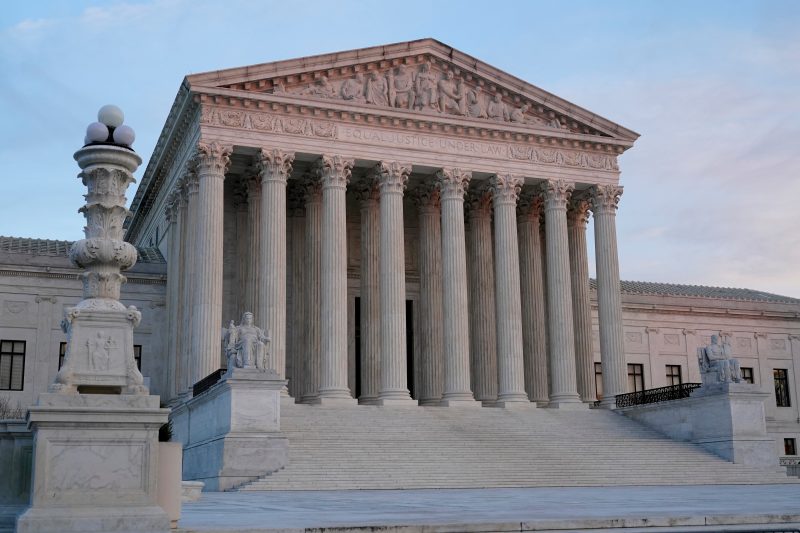
Biden’s student loan forgiveness program comes before Supreme Court


President Biden’s far-reaching initiative to forgive student loan debt will be debated this week before a Supreme Court that is skeptical of the administration’s bold claims of power — a nearly half-trillion-dollar showdown that could affect more than 40 million Americans.
Tuesday’s oral arguments bring together a string of combustible issues: an ambitious program aimed at fulfilling a campaign promise for Biden’s political base; heightened suspicion by the Supreme Court’s conservative supermajority about the ability of federal agencies to act without specific congressional authorization; and the power of Republican-led states to use the judiciary to stop a president’s priorities before they even take effect.
“Canceling hundreds of billions of dollars in student loans — through a decree that extends to nearly all borrowers — is a breathtaking assertion of power,” Nebraska Attorney General Michael T. Hilgers (R) writes in a brief filed on behalf of his and five other GOP-led states.
Education Secretary Miguel Cardona says the administration has the authority to forgive student loan debt under the Higher Education Relief Opportunities for Students Act of 2003. It allows the secretary to waive or modify loan provisions in response to a national emergency — in this case the coronavirus pandemic.
Cardona proposed a plan that would eliminate up to $10,000 of student debt for borrowers earning up to $125,000 annually, or up to $250,000 for married couples. Those who received Pell Grants, a form of financial aid for low- and middle-income students, are eligible for an additional $10,000 in forgiveness. About 20 million borrowers could see their balances wiped clean.
U.S. Solicitor General Elizabeth B. Prelogar, who will defend the administration’s program at Tuesday’s hearing, says not only are Cardona’s actions justified by the law, they are exactly what Congress had in mind when it passed the HEROES law in the wake of the 9/11 terrorist attacks.
“The Secretary’s interpretation is not just a plausible reading of the statute; it is the best reading,” Prelogar wrote in a brief to the justices. “The Court should reject respondents’ distortion of the Act and their effort to deny student-loan borrowers the relief that Congress authorized and that the Secretary deemed essential.”
But the administration’s track record at the court — fortified in recent years with justices nominated by President Donald Trump who are more conservative than their successors — is not encouraging for the president.
The court has lifted a pandemic-era moratorium on rental evictions put in place by the Centers for Disease Control and Prevention. It threw out a coronavirus vaccination-or-testing mandate imposed on large businesses by the Occupational Safety and Health Administration. And in a ruling unrelated to the pandemic, it cited the “major questions” doctrine to limit the Environmental Protection Agency’s options for combating climate change.
The doctrine, Chief Justice John G. Roberts Jr. wrote in the EPA opinion, addresses “a particular and recurring problem: agencies asserting highly consequential power beyond what Congress could reasonably be understood to have granted.”
For that reason, many experts believe the administration’s best chance in the student-loan plan is to convince the court that neither the Republican-led states nor two individuals in a separate case from Texas have legal standing to challenge the initiative. Such a conclusion would relieve the court of having to rule on the merits of the case.
Key details on Biden’s student loan forgiveness
1/2
End of carousel
To qualify to challenge the loan-forgiveness effort, the plaintiffs must show they have suffered a specific, rather than generalized, injury that can be remedied by relief from a federal court. In this case, it is not enough just to object to the size of the program or even to allege that the president has exceeded his authority.
A panel of the U.S. Court of Appeals for the 8th Circuit gave the states a toehold to continue their suit by finding that the Missouri Higher Education Loan Authority, a quasi-independent entity, could suffer losses from the program change that would hurt Missouri, one of the challenger states. A different court said two borrowers, Myra Brown and Alexander Taylor, have standing to proceed. Taylor doesn’t qualify for $20,000 of forgiveness, while Brown is ineligible altogether.
In her brief, Prelogar strenuously objected to both those decisions. The Missouri loan authority is independent of the state in many ways, she noted, and chose not to sue on its own. The challenge of Brown and Taylor would not benefit them, but instead would make it that no one gets relief from the loan forgiveness program, Prelogar wrote.
The question of whether anyone has standing to challenge the president’s actions has been part of the controversy over the initiative since Cardona announced it, and has launched a spirited debate among the amicus briefs filed in the case.
Law professors Samuel L. Bray and William Baude, from Notre Dame and the University of Chicago, respectively, say they are opposed to the loan forgiveness program. But they nonetheless say the court should ditch both cases, arguing that none of the plaintiffs have proper standing to bring the challenges.
Even if the executive branch has exceeded its authority, they say in their brief, “that does not permit the judicial branch to exceed its authority.” They noted that partisan challenges of presidential authority have become predictable.
“When a Republican administration is in power, attorneys general from Democratic states line up (most often as a group) to challenge any politically controversial act by the federal government; and when a Democratic administration is in power, the roles are reversed,” Bray and Baude say in their brief. Republican attorneys general initiated around 50 lawsuits against the Obama administration; Democratic state attorneys general initiated over 130 lawsuits against the Trump administration; and Republican state attorneys general have filed nearly 50 lawsuits against Biden during his first two years in office.
Others say just as troubling, though, is an administration exceeding its power and trying to write the program to nullify any challenge.
From the time Biden was elected, activists and some congressional Democrats have waged a relentless campaign to get him to fulfill his promise to cancel at least part of the $1.6 trillion in federal student debt.
Biden directed the Education and Justice Departments to produce memos on his administrative power to forgive loans but expressed skepticism. Senate Majority Leader Charles E. Schumer (D-N.Y.), Sen. Elizabeth Warren (D-Mass.) and Rep. Ayanna Pressley (D-Mass.) were adamant that Biden could use the same authority to cancel debt that Trump’s administration used to temporarily waive student loan payments during the pandemic, a pause that has been extended multiple times and continues today.
Other Democrats weren’t so sure. In July 2021, then-House Speaker Nancy Pelosi said, “People think that the President of the United States has the power for debt forgiveness. He does not … That has to be an act of Congress.”
But the Biden administration found the power in the HEROES Act, which allows the education secretary to “waive or modify any statutory or regulatory provision applicable” to federal student loan programs. The statute authorizes action to help individuals who suffered from a national emergency and to ensure they were “not placed in a worse position financially” regarding their loans.
A brief filed by 43 Republican senators said that is not authorization to make borrowers better off, and that the Biden administration simply took advantage of the national emergency.
“The President is not a king, and he has no power to dispense with the lawful acts of the legislature,” the senators wrote in their brief. “Though the Administration has structured, and even amended, the Cancellation Program in a cynical effort to avoid judicial scrutiny of its arrogation of legislative power, those efforts should not succeed.”
A brief filed by Republican former judges, attorneys general and other officials says allowing the program to go forward would endanger the separation of powers.
“This represents one of the largest expenditures in the nation’s history, carried out in the face of clear congressional opposition and supported by no accepted principles of statutory interpretation — let alone the specific statement that is necessary before the executive branch can spend Treasury funds,” said the brief filed by former federal judge Michael McConnell and former attorney general William P. Barr, among others.
Prelogar has answers for each charge. The size of the program — estimated at $430 billion — is simply a reflection of the problem to be solved: “the federal student-loan portfolio (approximately $1.63 trillion), the number of borrowers (approximately 43 million), and the unprecedented scope of the once-in-a-century COVID-19 pandemic (which has triggered over $5 trillion in government spending on other relief measures).”
She characterizes the arguments Biden used the pandemic as a pretext to fulfill a campaign promise as “based on legally irrelevant political statements that cast no doubt on the [Education] Secretary’s stated rationale.”
And she notes that there was little objection to suspending payments, which started during the Trump administration. That plan “was adopted in 2020, effectively ratified by Congress, carried forward across two administrations for three years, and never questioned by any court.”
Moreover, her brief stated, “a three-year suspension of interest accrual could be worth significantly more than the plan’s $10,000 forgiveness.”
The legal battles have left millions of student loan borrowers in limbo. More than half of eligible people had applied for the forgiveness program before it was halted by the courts, with the Education Department approving some 16 million applications. The department has assured borrowers that the administration will discharge the debt if it prevails in court.
The cases are Biden v. Nebraska and U.S. Department of Education v. Brown.
